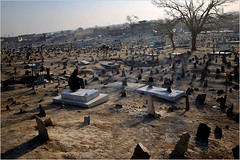
An Afghanistan cemetery is becoming overcrowded resulting from the US/NATO occupation of their country where thousands of civilians are killed every year. The Obama administration will send another 17,000 US occupation forces.
Originally uploaded by Pan-African News Wire File Photos
By Dan Balz
President Obama's unannounced visit to Iraq on Tuesday put a final exclamation point on a weeklong foreign trip designed to signal to the rest of the world a clean break from the presidency of George W. Bush. But it also underscored the ownership Obama has taken of a conflict in Afghanistan that, in foreign policy, could be as defining for his presidency as Iraq was for Bush's.
Nothing symbolizes the differences between Obama and Bush more loudly than Iraq. Obama's early opposition to the invasion set him apart not only from the former president but also from now Secretary of State Hillary Clinton during their competition for the Democratic nomination. His antiwar posture helped him win the nomination and the presidency.
As president, he has set in motion a plan to withdraw all combat forces from Iraq by late summer 2010. Traveling there Tuesday will draw attention to his commitment to end one of the most unpopular wars in American history, while giving him the opportunity to thank the military personnel for the sacrifices they have made there.
White House officials said the president added Iraq, rather than Afghanistan, to the end of his trip in part because of proximity -- it was a short flight from Istanbul to Baghdad. But it allowed the president indirectly to remind voters of a campaign promise largely kept.
Traveling to the war zone in Afghanistan would have highlighted a pledge that may be less popular, as Obama has significantly raised the stakes there since taking office. He has approved a sharp increase in the number of U.S. forces and set as a goal the defeat of al-Qaeda and the Taliban. Afghanistan could prove even more intractable for Obama than Iraq proved to be for Bush.
White House officials have sought to highlight the reception Obama has received throughout the week, both from people in Great Britain, France, Czechoslovakia and Turkey and from the leaders with whom he met. "There was a sense that America was back," White House Chief of Staff Rahm Emanuel told reporters.
What did that mean? Back without swagger? Back without unilateralism? Back without demands? Back without arrogance? Back, apparently, without whatever descriptor the administration wants to apply to draw a contrast with the previous administration.
Back with a new style to be certain. Obama's lower-key, less confrontational style is a contrast with Bush's. But back with a clear agenda or a set of policies widely embraced by U.S. allies? That too drew comment throughout the week, and on that, the trip ends with question marks rather than conclusions.
Administration officials understandably chose to highlight the positives, noting in their final briefings that they did not expect Obama's first foreign trip to change the world or produce agreement on the details of his policies with America's allies. Their hope is that Obama has created a sense of trust and respect that will allow him to accomplish internationally what Bush was not able to.
But all of that is in the future.
Abroad, Obama was greeted as both president and celebrity, a combination enjoyed by few of his predecessors. At home, public opinion remains solidly behind Obama and his agenda. The latest evidence came in a newly released New York Times-CBS News poll. His overall approval rating was 66 percent and support for his economic and foreign policy agendas was at almost 60 percent.
Coming after an opening phase of Obama's presidency that has been marked by both highs and lows, the survey suggests a reservoir of support -- and also measured expectations on the part of the public. That gives Obama some time to translate his new initiatives into concrete results.
He will have to produce most quickly on the economy, given the overwhelming public concern about the job losses reported over the past months. But his major international challenge will be Afghanistan, where the United States has been engaged now for more than seven years. Military leaders have warned of increased U.S. casualties as the size of the force there increases. Diplomatic officials have described Afghanistan and Pakistan as more complex and intractable than Iraq.
Throughout the campaign, Obama highlighted the need to do more in Afghanistan. That helped draw a contrast with the Bush administration and, toward the end of the election, divert attention from a debate about whether Bush's surge policy in Iraq had been a success.
As president, Obama has begun to shift the focus of his anti-terror policy away from Iraq to what he has long called the true central front in that battle (though his administration has excised "global war on terror" from its lexicon).
In Iraq, officials said Tuesday, the solution rests on political compromise more than military action. In Afghanistan and Pakistan, the administration has embraced a vigorous policy of both firepower and aggressive diplomacy. The other leaders with whom he met on his trip embraced his goals for Afghanistan but did not step up to offer help with additional combat forces.
Iraq will always be George W. Bush's war. Good will aside, Afghanistan is now primarily in Obama's hands.
No comments:
Post a Comment